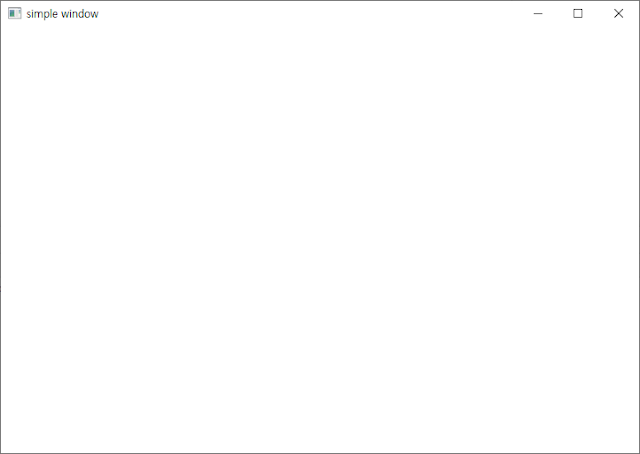making menubar and menu on QML
Qt Quick Control module has ApplicationWindow object that has menubar, toolbar, footer and contents areas. in this page, I will introduce how to make menubar.
first of all, we need application engine in python. so you can learn the way how to make the application object in python from how to use Qt Quick Controls in PySdie2
we need simple window like below.
WindowApplication is invisible by default. so, we should set the visibility to true. and the properties that I used above are derived from QML Item object.
ApplicationWindow has its own properties like below.
we will focus on only menubar property of them in this page.
the way how to declare MenuBar object is like below.
if you do it like above, you can see the empty menubar.
and then, we will add some menus to it.
if you add "&" in front of the title string, first character of string is underscored.
at last, we will add some actions to empty menu.
just declare Action object inside menu object.
Action object has triggered signal. if the action is clicked, onTriggered handler will be called. when called, I printed out the name of action to console
first of all, we need application engine in python. so you can learn the way how to make the application object in python from how to use Qt Quick Controls in PySdie2
we need simple window like below.
import QtQuick 2.13 import QtQuick.Controls 2.13 ApplicationWindow { visible: true width: 720 height: 480 title: "simple window" }
WindowApplication is invisible by default. so, we should set the visibility to true. and the properties that I used above are derived from QML Item object.
ApplicationWindow has its own properties like below.
- activeFocusControl : Control
- background : Item
- contentData : list
- contentItem : Item
- font : font
- footer : Item
- header : Item
- locale : Locale
- menuBar : Item
- palette : palette
we will focus on only menubar property of them in this page.
the way how to declare MenuBar object is like below.
import QtQuick 2.13 import QtQuick.Controls 2.13 ApplicationWindow { visible: true width: 720 height: 480 title: "simple window" menuBar: MenuBar{ } }
if you do it like above, you can see the empty menubar.
and then, we will add some menus to it.
import QtQuick 2.13 import QtQuick.Controls 2.13 ApplicationWindow { visible: true width: 720 height: 480 title: "simple window" menuBar: MenuBar{ Menu{ title: "Menu1" } Menu{ title: "Menu2" } Menu{ title: "&Menu3" } } }
if you add "&" in front of the title string, first character of string is underscored.
at last, we will add some actions to empty menu.
import QtQuick 2.13 import QtQuick.Controls 2.13 ApplicationWindow { visible: true width: 720 height: 480 title: "simple window" menuBar: MenuBar{ Menu{ title: "Menu1" Action{ text: "Action1" onTriggered:{ console.log("action1!") } } Action{ text: "Action2" onTriggered:{ console.log("action2!") } } } Menu{ title: "Menu2" } Menu{ title: "&Menu3" } } }
just declare Action object inside menu object.
Action object has triggered signal. if the action is clicked, onTriggered handler will be called. when called, I printed out the name of action to console







Comments
Post a Comment